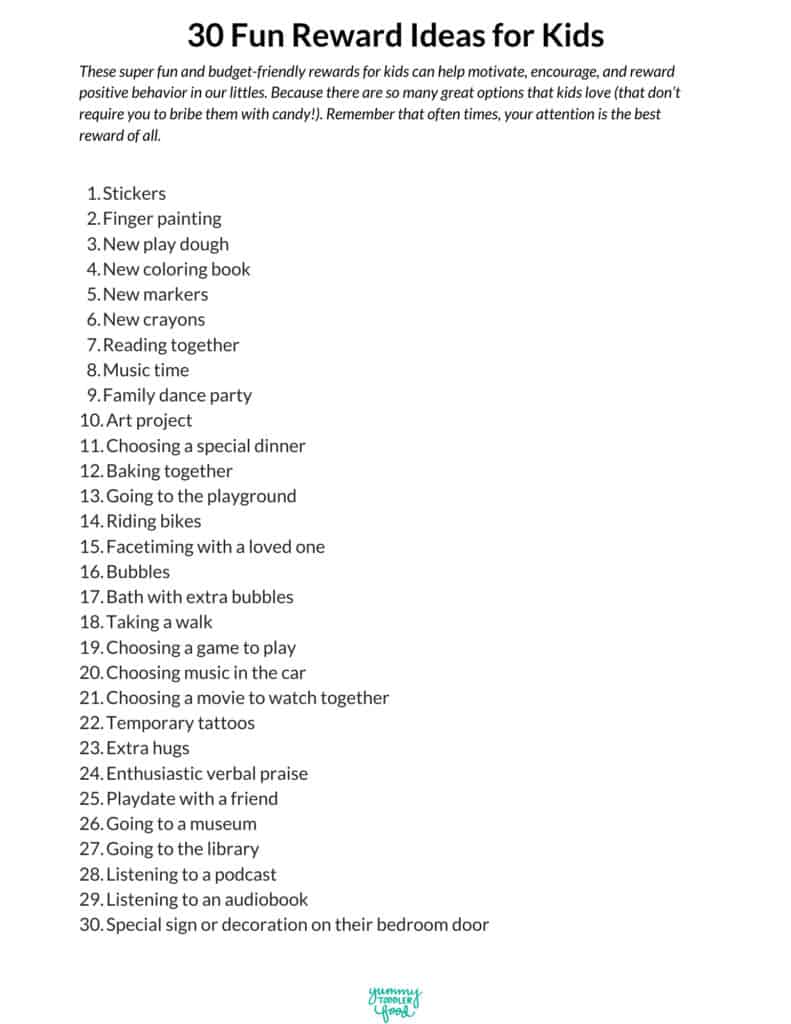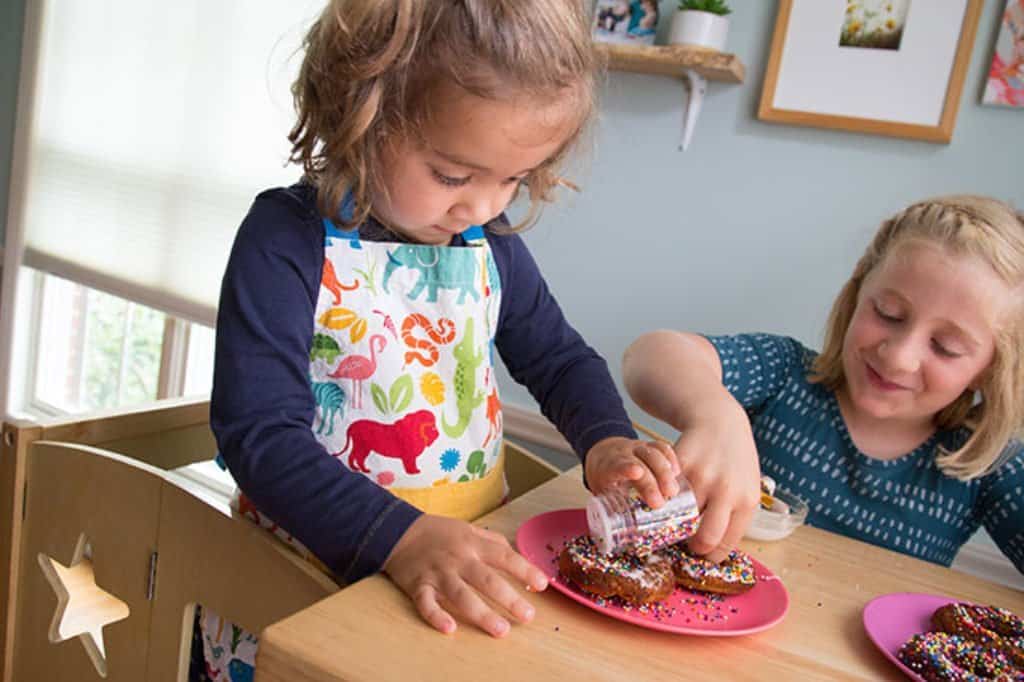These super fun and budget-friendly rewards for kids can help motivate, encourage, and reward positive behavior in our littles. Because there are so many great options that kids love (that don’t require you to bribe them with candy!).

Rewards for Kids
We can all use some easy tactics to help encourage behavior in our kids, but it seems like we too often rely on treat-type foods. And there are so many other options that don’t create potentially tricky relationships with food. I have a nice list of them today to offer ideas to use with your kids, plus thoughts on why we might want to consider steering clear of using candy and food rewards as much as we do.
Easy Reward Ideas for Kids
Use this list of reward ideas to help your kids know that you appreciate their good work without relying on treats to make them feel appreciated. Obviously, the ones you choose will depend on what your kids like and enjoy, their age, and what you happen to have on hand! (P.S. Clearly skip any of these that aren’t safe right now.)
- Stickers
- Finger painting
- New play dough
- New coloring book
- New markers
- New crayons
- Reading together
- Music time
- Family dance party
- Art project
- Choosing a special dinner
- Baking together
- Going to the playground
- Riding bikes
- Facetiming with a loved one
- Bubbles
- Bath with extra bubbles
- Taking a walk
- Choosing a game to play
- Choosing music in the car
- Choosing a movie to watch together
- Temporary tattoos
- Extra hugs
- Enthusiastic verbal praise
- Playdate with a friend
- Going to a museum
- Going to the library
- Listening to a podcast
- Listening to an audiobook
- Special sign or decoration on their bedroom door
TIP: It’s always humbling, and honestly reassuring, to realize that often what the kids want is just time with us without distractions.
More About Food Rewards
You know, M&Ms for going potty; a lollipop at the end of soccer practice; dessert for eating dinner; a pizza party prize from the PTA—these are just a few of the ways that us adults use treat foods to reward kids for good behavior. I LOVE doing a food experience together, like cooking or baking with the kids, but it frustrates me when food is used as a quick transaction to reward the kids for doing something (or to make them do something faster).
We asked Leslie Schilling, RDN, a registered dietitian and nutrition therapist who wrote about this issue for US News & World Report to help us sort through this issue.
Some parents bemoan the extra sugar that these treats represent, which is understandable, but we’re actually more concerned about the weird message it sends kids about needing to earn their food. “It gives food a false power. We don’t hear anyone say ‘We’re going to do this amazing veggie party!’ so it further makes foods that our culture finds less desirable more taboo—because it’s always desserts and treats,” she says.
“It gives food more power than it deserves and makes it transactional instead of something that’s for pleasure and to satisfy our body’s need,” she says. Not to mention that we’re teaching kids not to listen to their bodies and their hunger.
There’s also the issue that when kids are set up to earn food, it removes the intrinsic desire for them to work for things just because they’re enjoyable or they’re proud of their accomplishments.
When Using Treats as Rewards Backfires
“When we elevate foods to be super special, we tend to make kids want them more,” Leslie says. She recommends reiterating that food is food. Plus, there’s the issue that may food rewards inherently exclude kids with food allergies.
If you had a treat planned and you remove it for bad behavior, that’s using food as a reward too. Try to separate behavior and food whenever you can even though I fully realize that can be difficult in life with kids. This takes practice and you won’t always do it perfectly, so be patient if you’re trying to work on this issue.

Dessert with Dinner
If you’ve been in the habit of using dessert as a reward for the kids eating their dinner, or certain parts of their dinner (ahem, broccoli), you can try telling your kids that you’re going to try something new. Try serving a portion of dessert with dinner because the more we habituate that food is food, the more we’ll see it become just food to our kids.
We can use what’s usually reserved for treats without strings by not saying anything about it and simply putting it onto the plate with the other foods and letting the kids decide what to eat and how much in any order they desire.
TIP: Read more about this approach known as the Division of Responsibility here.
When Kids Get Rewards at Practices and Games
This can vary a lot depending on where you live, but if your kids regularly get treats and snacks for playing games or doing their practices, here’s what you can do. “When kids get older, talk to them about what’s happening and remind them that you want them to listen to their body. And that in our family, we don’t use food as a reward,” Leslie says.
We can enjoy food without needing to earn it.
With team sports, try offering another solution to the snack sign up such as a hydration station. Or working with the league to come up with a list of recommended snacks to standardize what’s being given out. This will likely save everyone money too!
When my kids get food after soccer, for example, I like to have them bring it home to eat with the next meal (since it’s almost always right before lunch) so they’re sitting down and eating a full meal rather than having an extra snack.

Food Rewards in School
Public schools all have a Wellness Policy and it usually has a section on treats. Food rewards may or may not be specifically addressed. If you’ve never seen your Wellness Policy, ask the principal to direct you to where it lives on the school website and read it through. If something is happening regularly that’s expressly discouraged, email the principal or teacher and let them know.
You can say something about how using treats to reward reading or math undermines your ability to teach your child to trust their hunger and fullness, it makes those foods more appealing, and it takes away the intrinsic motivation for kids to learn for fun and the feeling of mastering something. (Use the language in the Wellness Policy if you can refer back to it if you want to simplify this.)
It can be a little tricky to help younger kids understand what’s going on, but whenever my daughter gets a reward for something or brings home a reading incentive, I always try to remind her that she doesn’t need to earn food. She can read or learn just because it’s fun. There are plenty of other ways to celebrate success.
TIP: Download the printable rewards chart in my Free Resource Library.
Related Posts
Activities
Master List of Free Activities for Kids
Activities
100+ Easy Activities for One Year Olds
Activities
Best 2-Ingredient Playdough Recipe
This post was first published January 2019.




























I love almost everything you post. One thing here did catch my eye. You say you would reach out to the principal, not the teacher because you wouldn’t want the teacher to feel as if you’re telling them how to do their job. As a teacher, one of the most frustrating things for most of us is when a parent goes directly to the principal. It may not feel like it – but it comes off as “Tattling” to their boss. Imagine in most work places, going directly for a manager. It often can feel demeaning. Just as a thought, from a teacher/administrator.
That makes a lot of sense, thank you for adding that! I will tweak how I phrase that. I think what I meant to say was something more like “if this is an emotional issue for you and/or you have already directly communicated with the teacher and feel like it wasn’t productive or you came away feeling like you were not able to effectively communicate, then it might be a good time to reach out to the principal for support”. So much of this depends on how we communicate and what specifically we’re trying to address. Thanks again!